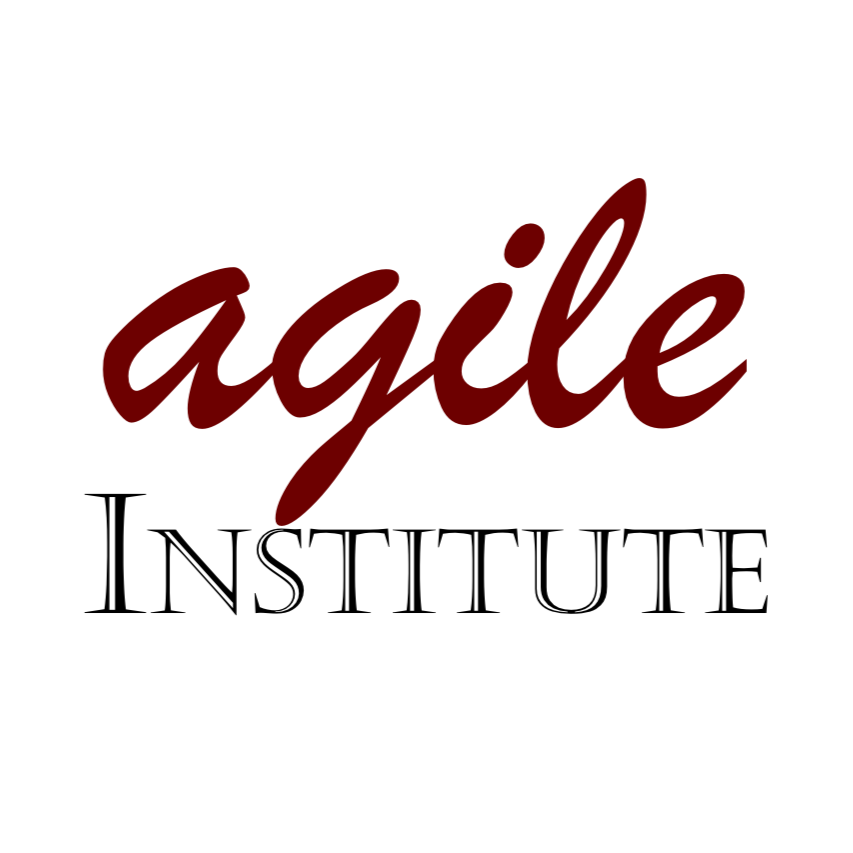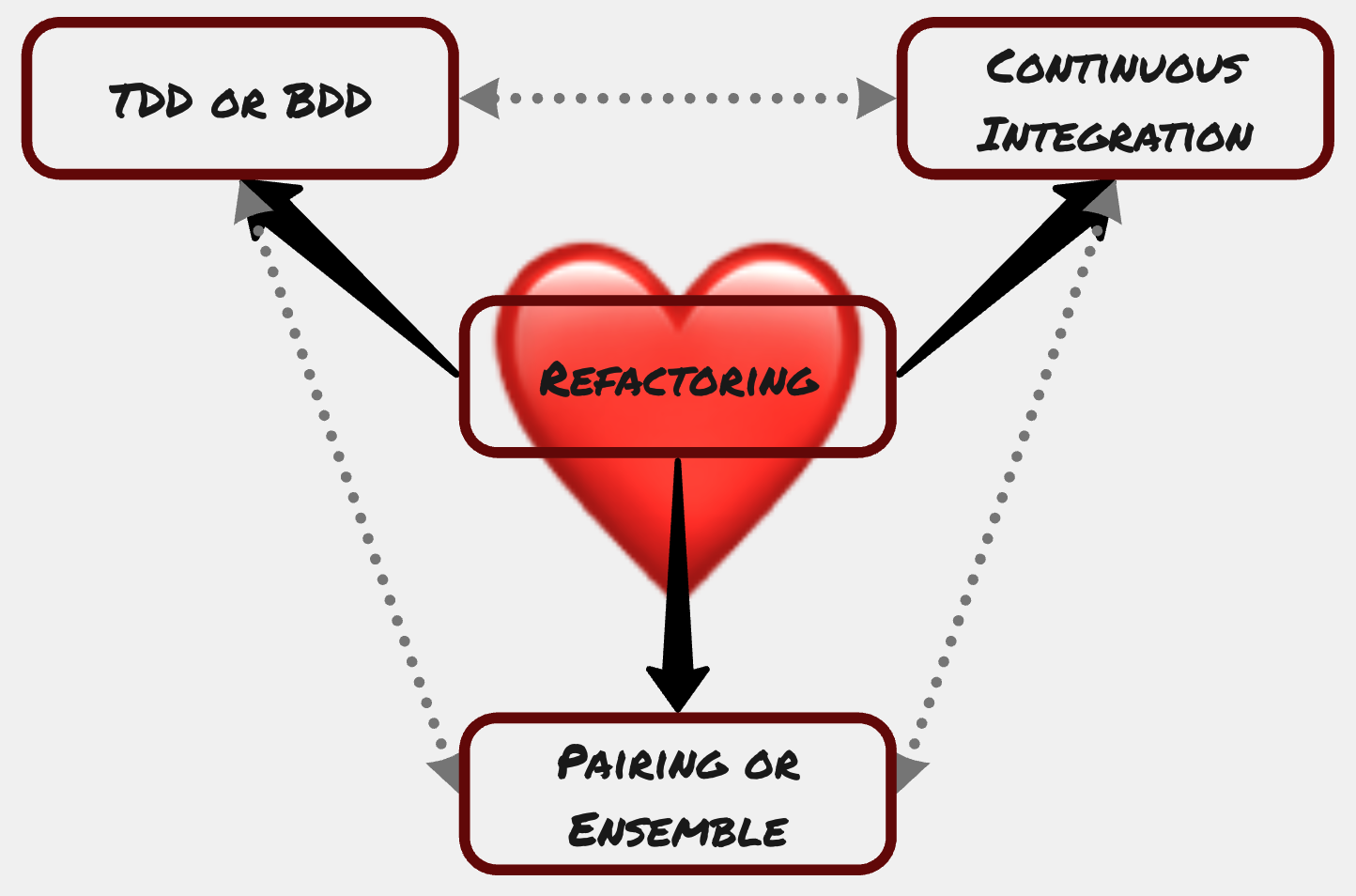Developer Agility Week
Making the Agile promise of greater software value and quality truly happen!
An immersive, intensive 5-day (35 hour) course exploring the Agile developer capabilities (aka Scrum Developer Practices or Extreme Programming practices) and foundational team frameworks (Scrum or Kanban) while building your actual production software.
Rob Myers works with your team, in your offices, on your product requests (Scrum Product Backlog Items, XP User Stories, Kanban work-items); immersing the team in the type of real-world programming environment that he has experienced on numerous highly successful Agile teams.
Developer practices may include Test-Driven Development, Refactoring, Continuous Integration, Collective Code Stewardship, Pair Programming, Behavior Driven Development, and Incremental Design.
Leaders
You want to be able to enhance your software products with creative, innovative features.
You don’t want to lose your team for a whole week of training.
Teams
You want to build software in a sane, professional, personally enriching, value-generating environment.
You also want to hone your skills and those of your teammates.
For software development, “going Agile” isn't enough. Self-organization isn't enough.
In order to produce highly valuable software with high quality now and in the future, developer practices have to change. Teams need to be ready to make ongoing changes without breaking any existing features. This requires experience with highly iterative and incremental Agile developer practices.
The “Core Four”
This workshop focuses on a handful of core incremental software engineering practices that have been proven to improve the reliable delivery of valuable, quality software.
Rob Myers works with your team, in your offices, on your product backlog; immersing the team in the type of real-world programming environment that he has experienced on numerous highly successful Agile teams.
The result will be better software right now! No waiting for the team to make the leap from classroom to team space. The ROI begins immediately.
Upon completion of this week-long workshop, attendees with 12 months of experience on a Scrum team may qualify for the Scrum Alliance’s Advanced Certified Scrum Developer® certification.
“How is this similar to your other complete A-CSD courses?”
We cover the same topics, including all of the CSD and A-CSD learning objectives. We may occasionally do an isolated lab to focus on one particular challenge before applying that knowledge to your daily work. Each attendee is given our standard CSD/A-CSD workbooks.
“How is this course unique?”
Attendees don't merely practice on a sample lab, but they apply the learning to their actual work. We might skip a section of the workbook in favor of this hands-on approach.
Topics are covered on demand. For example, the typical A-CSD course covers all Scrum events on the first day and saves tech practices for the other three days. In this workshop, we cover the Scrum events as they occur, and cover most technical practices as the need becomes evident.
Depending on the team’s needs, experiences, and challenges—as determined by Rob and the team during the course—your team may settle upon various comprehensive combinations of practices in order to be successful. Leaders won’t need to choose up front which particular practices will be used. They will get to enjoy the benefits of these new ways of working.
Options
Kanban:
“Doubly Extreme Agile”: We start with a review of Kanban basics, and then work on your next work-item/request, e.g., using Behavior Driven Development, Ensemble (née “Mob”) Programming, Refactoring, and Continuous Deployment.
Scrum:
“Enhanced Scrum”: We start with a review of Scrum basics, hold a lightweight planning session, then operate the rest of the course as a sprint, including review and retrospective. The team will adopt the set of practices needed to successfully complete your PBIs/User-Stories. E.g., Test-Driven Development, Pairing, Refactoring, and Continuous Integration.
Developers who successfully complete this course—and have 12 months of documented work on a Scrum team—qualify to receive Scrum Alliance’s Advanced Certified Scrum Developer® (A-CSD) credential. Others on the team might qualify for Scrum Alliance’s Certified Scrum Developer® (CSD), depending on how they typically interact with—and how much time they spend with—the developers during the week.
Technical Environments:
Typically the course is delivered in a way that is generalized for any software development environment. The course can be taught in multiple programming languages at the same time, as long as developer preferences are known well in advance.
The course can also be oriented towards particular technologies. For example, in the past, these were a focus:
Amazon Web Services (AWS): Labs will be oriented towards AWS Serverless Application Model (SAM) and ways to develop your Lambda functions test-first.
Test-first with React.js or Angular: JavaScript or TypeScript only.
Objectives
Get something done, to offset the costs of setting aside a week for training.
Experience first-hand a variety of individual practices and how they improve team communication, product quality, and maintainability. Includes Continuous Integration, Test-Driven Development, Pair Programming, and others.
Express why our industry needs these professional development & engineering practices.
Express why these particular practices are well-suited for Agile frameworks such as Scrum & Kanban.
Experience techniques for teams and individuals to stick to these practices in a realistic disciplined way.
Learn more about these capabilities here: Frequently Asked Questions about Agile Technical Skills
Audience
Whole teams, with a primary focus on software developers, lead programmers, and architects. Each participant will be working closely with others to craft real code.
Prerequisites
Dev-team availability. Whole team preferred. Access to product/BAs/testers may be necessary at various times during the week.
Familiarity with an Agile framework such as Scrum, XP, or Kanban.
Testimonials
What leadership is saying about Developer Agility Week:
“Investing in training developers [in iterative & incremental] practices results in high quality software that is scalable and maintainable. There will be a measurable return on this improvement in the coming months.”
“This initiative gave us the opportunity to challenge our existing processes deeply. What initially seemed inconceivable on day one quickly transformed into tangible progress by day two. By the end of the week, I was thrilled to see individuals come together as a cohesive team, eager to put these new practices into action. The survey rated Agility Week 4.7/5, with participants valuing hands-on training in TDD, Pair Programming, and Refactoring, alongside process improvements and collaboration. Key takeaways include the importance of pairing, swarming, and test coverage as investments in quality. Suggestions focused on sustaining practices through updated working agreements, spot training, and providing time for adoption.” — Sean B.
“We have already implemented meaningful improvements to enhance our way of working:
Two-Week Sprints: Faster feedback loops + more focused, achievable intervals.
Work Items by Priority, Not Assignee: Shifting focus from “my tickets” to collective stewardship, aligning efforts with product goals.
Continuous Collaboration: An 'always on' virtual collaboration space for screen sharing, pair programming, and code reviews.
These changes are designed to foster teamwork, improve efficiency, and deliver higher-value outcomes.”
— a PM/SM at a very successful startup
What team members have been saying about Developer Agility Week:
“I enjoyed the balance between hands on work with our own project and mini lectures/ discussions on the various CSD topics we covered. This helped me learn more about them through practical applications. Overall, I just really enjoyed the training. It was fun and light-hearted while providing a valuable learning experience. Even with the remote format, I was able to feel connected, stay focused, and have a great time!” — Anaya Taylor, IT Software Engineer Intern, Georgia Tech Undergrad
“Good test coverage takes a little more time but is a major investment in software quality and overall maintainability of the system.”
“TDD allows us to make bigger changes and hopefully not have so much time in QA, so we should be able to ship more value to the CSRs/Admins/Customers.”
“Provided tools essential to break entrenched habits that hinder collaboration.”
“It was very productive and good for improving our processes.”
“Engineering came together to discuss work processes, learn from an industry expert, and worked side by side on building new features.”
“More collaboration and sharing with team members leads to better and more maintainable code.”
“Providing the team with the necessary space, time, and resources to implement these changes, which are initially slow and require substantial investment and buy-in, will lead to exponential improvements in productivity and efficiency over the long term.”
“Your course has made me like coding again, and gives me hope. Thanks for everything!”
“Thank you for the awesome course, Rob!”

